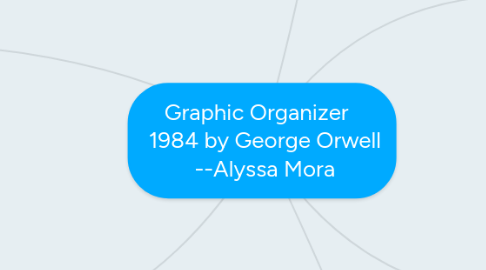Graphic Organizer 1984 by George Orwell --Alyssa Mora
저자: alyssa mora

1. Foreshadow: literary device; refers to use of indicative word/phrases that give reader hint of something that is going to happen without revealing the story Example- "The girl with dark hair was coming toward him across the field. With what seemed a single movement she tore off her clothes and flung them disdainfully aside" (pg.31) Effect: This quote in Part 1, Chapter 3 of the novel foreshadows to Part 2, Chapter 2 when Julia and Winston eventually meet up and begin their secret relationship. Orwell utilizes this literary device in order to suspend the reader in thinking that there is a significance between Winston and the dark-haired girl, who he at first believes is part of the Thought Police. By incorporating her into Winston's dreams, Orwell is able to create the idea that Winston thinks of her exclusively apart from others, making her stand out.
2. Paradox: statement that appears to be self-contradictory or silly but may include a latent truth; also used to illustrate an opinion or statement contrary to accepted traditional ideas Example- "It was a bright cold day in April, and the clocks were striking thirteen"(pg.1) Effect: First of all, April falls in the Spring season, which already makes the reader's think as to why it's cold in April when it's actually supposed to be sunny and warm. The bright can represent the "good" in life, as in quiet optimism and everything that everyone is just supposed to accept. The cold can represent the threatening aspect of Big Brother and how the totalitarian government is controlling the lives of Oceania. Also, the clocks striking thirteen suggest that they use military time: adds emphasis to the control they are put under as a population. Orwell used these paradoxes to create emphasis on the un-normal circumstances they have as well as the military-like control they have to obey.
3. Flashback: interruptions that writers do to insert past events in order to provide background or context to the current events of a narrative Example- "His mother's memory tore at his heart because she had died loving him, when he was too young and selfish to love her in return," (pg.30) Effect: This quote is reflective of a flashback that Winston had in his dream about his mother. What's significant about this is that this type of emotion he experienced when thinking about his mother and sister is not necessarily allowed in Oceania, but he deems it important to recognize the sacrifices she made for him, even if he can't properly recall the events that happened. Orwell's intention of including this flashback is to reveal a personal aspect of Winston's personality about how he actually cares about the things he's not supposed to, which makes it more desirable to him.
4. Satire: technique employed by writers to expose and criticize foolishness and corruption of an individual or a society by using humor, irony, exaggeration or ridicule Example- "Who controls the past, controls the future: who controls the present, controls the past" (pg.37). Effect:Through this quote and its content, George Orwell demonstrates political satire with the way he over exaggerates the restrictions of a totalitarian government and the control it has over the people. The Ministry of Truth has to deal with altering events that have happened in the past, so considering that the government is capable of doing this, it says a lot about how the citizens of Oceania are deprived of their own freedom.
5. Symbol: the use of symbols to signify ideas and qualities by giving them symbolic meanings that are different from their literal sense. Example- "What appealed to him about it was not so much its beauty as the air it seemed to possess of belonging to an age quite different from the present one. The soft, rainwatery glass was not like any glass that he had ever seen."(p.95) Effect: The symbolism behind the glass paperweight is something beautiful that came from the past, compared to their world without beauty. Orwell emphasized Winston's sense of rebellion because they are not allowed to desire anything or anyone. This is significant because it's a symbol of the strict limitations of Oceania, including something as worthless as a paperweight.
6. Symbol: the use of symbols to signify ideas and qualities by giving them symbolic meanings that are different from their literal sense. Example-"the homes of the four Ministries between which the entire apparatus of government was divided: the Ministry of Truth, the Ministry of Peace, the Ministry of Love, and the Ministry of Plenty" (pg.4). Effect: The irony behind the four ministries is that the names of the Ministries implies one thing, but in reality they are in charge of enforcing the opposite of their name. For example, Winston works at the Ministry of Truth, whereas he is actually in charge of altering historical events so that none of it is actually true.


